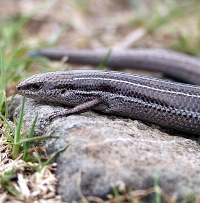 |
Image: Sylvain Dubey |
**__Related stories:__***linkurl:Genetic basis of XX males discovered;http://www.the-scientist.com/news/display/25087/
[16th October 2006]*linkurl:Platypus has 10 sex chromosomes;http://www.the-scientist.com/article/display/22471/
[28th October 2004]*linkurl:Sex determination in fish;http://www.the-scientist.com/article/display/20398/
[21st May 2002]




















